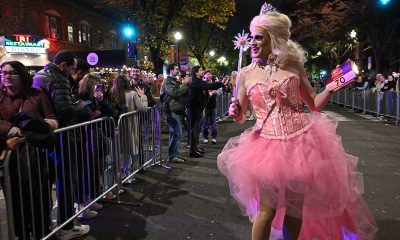Local
Liquor board refers Nellie’s case to D.C. attorney general
Report says fights began before Black woman was dragged down stairs

The D.C. Alcoholic Beverage Control Board on Wednesday asked the Office of the D.C. Attorney General to continue an investigation into allegations that a security officer at Nellie’s Sport Bar dragged a Black woman down a flight of stairs during a fight between security officers and other customers during the early morning hours of June 13.
The ABC Board made its referral to the office headed by D.C. Attorney General Karl Racine after it received a lengthy report about the Nellie’s incident from the city’s Alcoholic Beverage Regulation Administration (ABRA), which conducted its own investigation into the incident.
The 24-page ABRA report, which includes 19 pages of addendums, including D.C. police reports and summaries of witness interviews, accuses Nellie’s of being in violation of the D.C. Code pertaining to its liquor license by failing to follow proper procedures during an outbreak of violence on its premises.
ABRA spokesperson Aaron King told the Washington Blade the Office of the Attorney General will make the final determination on whether Nellie’s and its staff violated D.C. law or regulations pertaining to the Nellie’s incident. King said that if the OAG finds that violations did occur the ABC Board could then hold a Show Cause Hearing to determine whether to impose a monetary fine and/or suspend or revoke Nellie’s liquor license.
The public version of the report released on June 30 by ABRA includes dozens of blacked out names of witnesses and the names of one or more investigators who interviewed them.
The report and the investigation that prompted it came about after the release of a video by a Nellie’s patron on Instagram that captured the Nellie’s security guard dragging customer Keisha Young, 22, by her hair down a flight of stairs. The video, which went viral on social media, prompted expressions of outrage by LGBTQ activists and local LGBTQ and racial justice organizations, several of which joined forces to hold protests outside Nellie’s over the following two weeks.
Nellie’s released a statement Thursday night pointing out that the ABRA report also found the altercation began when “Nellie’s staff” were assaulted after they asked a group of patrons who reportedly brought in their own bottle of liquor to leave the establishment.
“Consumption of outside alcohol is against Nellie’s longstanding policy,” the statement says. “We don’t condone what followed and we terminated the security company responsible, closed the establishment for a period to further investigate and move forward with additional training and a new security company,” according to the statement, which adds, “We fully cooperated with ABRA on its investigation.”
Some of the groups participating in the protests outside Nellie’s in the weeks since the June 13 incident are calling for Nellie’s to close permanently regardless of what, if any, action ABRA or the ABC Board takes against Nellie’s, which has long been considered one of D.C.’s popular LGBTQ bars.
And some of the groups, including Harriet’s Wildest Dreams, a Black-led community defense group headed by Makia Green, who describes themself as a “queer trans non-binary Black liberation organizer,” have alleged that Nellie’s has a history of bias against people of color despite the fact that many of Nellie’s customers have been African-American men and women, LGBTQ and straight.
Preston Mitchum, a D.C. attorney and co-chair of the board of the local group Collective Action for Safe Spaces (CASS), said that as a former Nellie’s patron he observed practices by the Nellie’s staff and management that he believes were racially biased against Black customers long before the incident involving Keisha Young.
On the day following the incident, Nellie’s issued a statement saying it had immediately dismissed the private security company whose employee was shown on the video dragging Young down the stairs. Nellie’s also apologized for the incident, but did not specifically apologize to Young, prompting further expressions of concern by activists and Young herself, who said she was injured during the incident.
An attorney representing Young said he expected to file a lawsuit on her behalf against Nellie’s seeking damages for the injuries and emotional distress to which she allegedly was subjected during the incident.
The ABRA report states that an ABRA investigator, whose name is blacked out in the public version of the report, “determined that on Sunday, June 13, 2021, Nellie’s Restaurant & Bar, located at 900 U Street, N.W., Washington, D.C., was in violation of D.C. Official Code 25-823(a)(2).” The report adds, “Specifically, multiple assaults occurred inside the establishment while the licensee was engaged in a method of operation conducive to unlawful conduct. This determination was based on a review of Metropolitan Police Department (MPD) PD-251 reports, staff interviews, and surveillance from the establishment.”
The report also includes detailed accounts of statements made to ABRA investigators by Nellie’s customers, employees and the Nellie’s owner, who is not identified in the report but is widely known to be Douglas Schantz, a D.C. resident who lives within walking distance of Nellie’s.
In addition, the report includes a detailed description of video surveillance footage taken from Nellie’s own security cameras. It says the Nellie’s video shows that Young, who is not identified by name, had been involved in a fight with at least one other Nellie’s customer before she was dragged down the stairs by the security guard.
“The complainant of assault identified as [redacted name] wearing a blue outfit and long blond braids is seen at 1:29:32 a.m. at the bottom righthand corner of the frame,” the report says. “[Redacted named] is observed having words with another patron and then pushing [redacted name] and then punching him multiple times in the back of the head.”
Brandon Burrell, an attorney representing Young, has told media outlets that the security officers and Nellie’s employees appear to have mistook Young for another woman who reportedly brought into the bar a bottle of liquor, which prompted security to demand that those involved in drinking the outside liquor leave Nellie’s.
Burrell has also said that prior to her being pulled down the stairs Young got into an altercation with another security guard in an attempt to stop the guard from assaulting her cousin.
The ABRA report says the action by the security officers and a Nellie’s bartender to eject the patrons who reportedly brought in a bottle of Bacardi Limon and who were “consuming shots blatantly in front of the bar” from that bottle triggered the altercation that led to Young being dragged down the stairs.
Included in the ABRA report is a copy of a June 16 letter that D.C. Police Chief Robert J. Contee III sent to ABRA Director Fred Moosally expressing concern about Nellie’s handling of the altercation and calling on Moosally to open an ABRA investigation. Contee told Moosally in his letter that he learned details about the incident from patrons and others who filed police reports about the altercation, including a police report filed by Young on June 14 at the department’s Third District Station.
“Most concerning about this incident is that at no time did Nellie’s Sports Bar staff, management or ownership make any effort to contact the MPD to report the incident or to self-report the ABRA-related incident,” Contee states in his letter. “Instead, Nellie’s Sports Bar carried on with business as usual,” his letter says.
“Later that day, the incident apparently prompted an unscheduled First Amendment assembly in front of the establishment, which drew over a hundred protesters,” Contee wrote in his letter. “During this demonstration, Nellie’s Sports Bar ejected all patrons, locked their doors and closed for business.”
Later that day, Nellie’s announced it was temporarily closing while continuing to pay its employees and while contemplating how best to respond to the incident involving Young and the protests. The establishment has remained closed since that time.
The statement released by Nellie’s through its attorney Andrew Kline on Thursday night disputes Contee’s claim that Nellie’s didn’t call the police during the June 13 altercation.
“According to the ABRA report and contrary to published reports, and even MPD, Nellie’s personnel DID immediately notify MPD as this incident was occurring,” the statement says. “We will continue to work to identify and address all factors which may have given rise to this incident so that Nellie’s will be a safe and welcoming atmosphere for all,” says the statement.
It concludes by saying, “We plan to meet privately with several groups who have expressed concern about our operation so we might best understand all of the issues involved.”
The police report filed by Young lists the incident in which she was dragged down the stairs at Nellie’s as an “assault with significant bodily injury.”
Gay nightlife advocate Mark Lee said the action by ABRA and the ABC Board in response to the Nellie’s incident is standard practice seen when altercations surface at other establishments.
“ABC Board referral to the Office of the Attorney General is a commonly standard procedure in cases of this type and does not represent a finding or judgement in the matter,” Lee told the Blade. “As unfortunate as on-premise patron altercations are, they do sometimes occur at local establishments and are subject to review by both the ABC Board and OAG,” Lee said.
District of Columbia
Eleanor Holmes Norton ends 2026 reelection campaign
Longtime LGBTQ rights supporter introduced, backed LGBTQ-supportive legislation
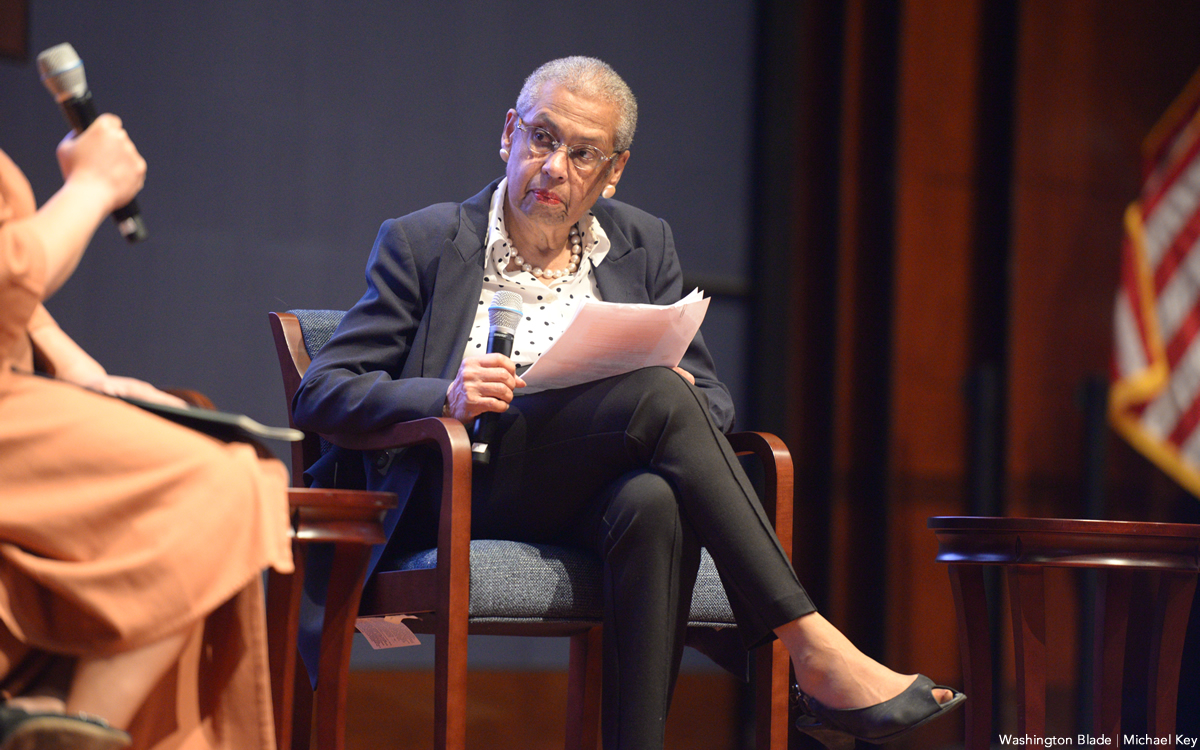
The reelection campaign for D.C. Congressional Delegate Eleanor Holmes Norton, who has been an outspoken supporter of LGBTQ rights since first taking office in 1991, filed a termination report on Jan. 25 with the Federal Elections Commission, indicating she will not run for a 19th term in the U.S. House of Representatives.
Norton’s decision not to run again, which was first reported by the online news publication NOTUS, comes at a time when many of her longtime supporters questioned her ability to continue in office at the age of 88.
NOTUS cited local political observers who pointed out that Norton has in the past year or two curtailed public appearances and, according to critics, has not taken sufficient action to oppose efforts by the Trump-Vance administration and Republican members of Congress to curtail D.C.’s limited home rule government.
Those same critics, however, have praised Norton for her 35-year tenure as the city’s non-voting delegate in the House and as a champion for a wide range of issues of interest to D.C. LGBTQ rights advocates have also praised her longstanding support for LGBTQ rights issues both locally and nationally.
D.C. gay Democratic Party activist Cartwright Moore, who has worked on Norton’s congressional staff from the time she first took office in 1991 until his retirement in 2021, points out that Norton’s role as a staunch LGBTQ ally dates back to the 1970s when she served as head of the New York City Commission on Human Rights.
“The congresswoman is a great person,” Moore told the Washington Blade in recounting his 30 years working on her staff, most recently as senior case worker dealing with local constituent issues.
Norton has been among the lead co-sponsors and outspoken supporters of LGBTQ rights legislation introduced in Congress since first taking office, including the currently pending Equality Act, which would ban employment discrimination based on sexual orientation and gender identity.
She has introduced multiple LGBTQ supportive bills, including her most recent bill introduced in June 2025, the District of Columbia Local Juror Non-Discrimination Act, which would ban D.C. residents from being disqualified from jury service in D.C. Superior Court based on their sexual orientation or gender identity.
For many years, Norton has marched in the city’s annual Pride parade.
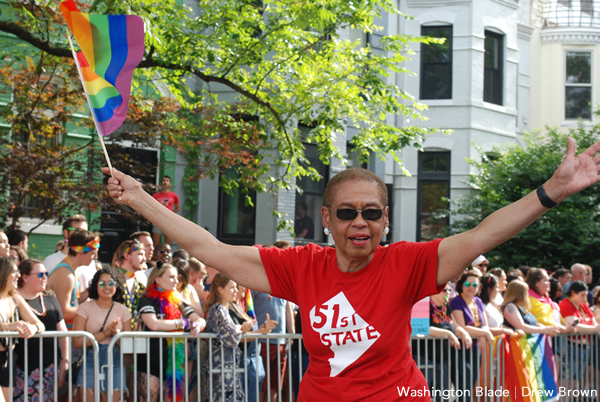
Her decision not to run for another term in office also comes at a time when, for the first time in many years, several prominent candidates emerged to run against her in the June 2026 D.C. Democratic primary. Among them are D.C. Council members Robert White (D-At-Large) and Brooke Pinto (D-Ward 2).
Others who have announced their candidacy for Norton’s seat include Jacque Patterson, president of the D.C. State Board of Education; Kinney Zalesne, a local Democratic party activist; and Trent Holbrook, who until recently served as Norton’s senior legislative counsel.
“For more than three decades, Congresswoman Norton has been Washington, D.C.’s steadfast warrior on Capitol Hill, a relentless advocate for our city’s right to self-determination, full democracy, and statehood,” said Oye Owolewa, the city’s elected U.S. shadow representative in a statement. “At every pivotal moment, she has stood firm on behalf of D.C. residents, never wavering in her pursuit of justice, equity, and meaningful representation for a city too often denied its rightful voice,” he said.
Sharon Nichols, who serves as press spokesperson for Norton’s congressional office, couldn’t immediately be reached for a comment by Norton on her decision not to seek another term in office.
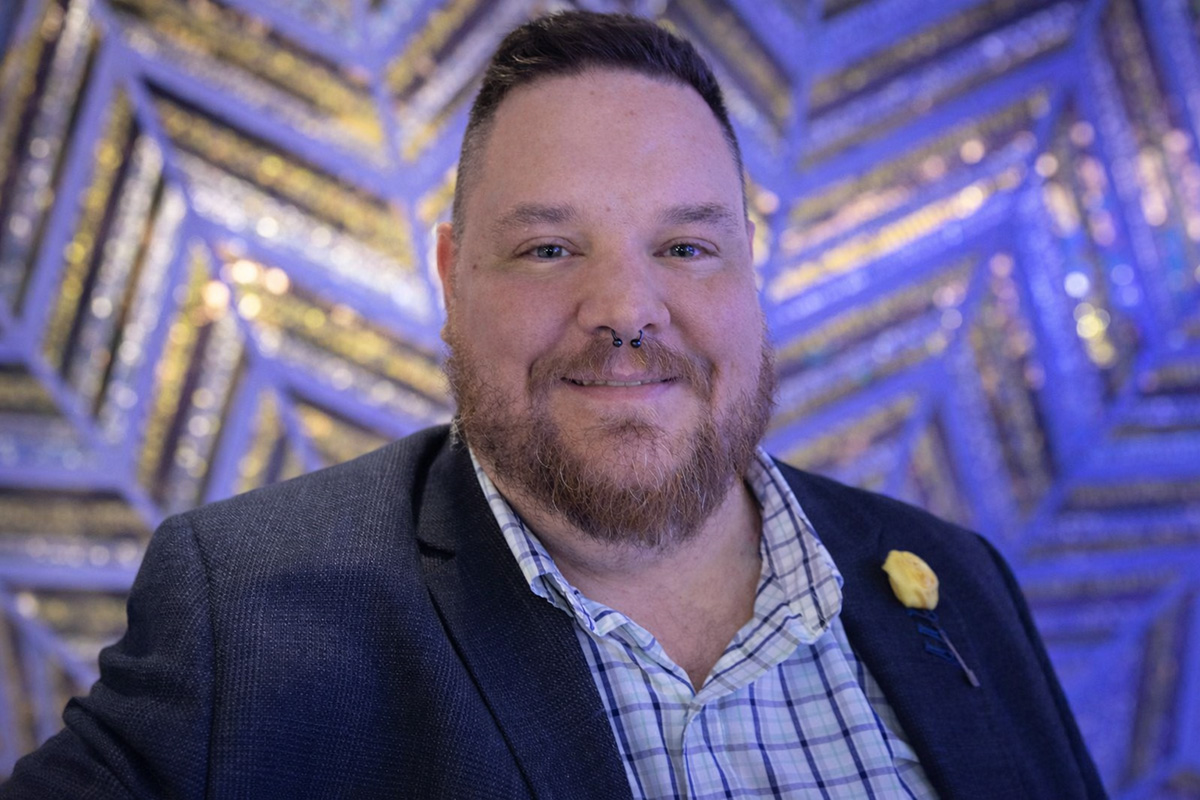
The Comings & Goings column is about sharing the professional successes of our community. We want to recognize those landing new jobs, new clients for their business, joining boards of organizations and other achievements. Please share your successes with us at [email protected].
The Comings & Goings column also invites LGBTQ+ college students to share their successes with us. If you have been elected to a student government position, gotten an exciting internship, or are graduating and beginning your career with a great job, let us know so we can share your success.
Congratulations to R. Warren Gill III, M.Div., M.A. on being appointed as the development manager at HIPS. Upon his appointment, Gill said, “For as long as I’ve lived in Washington, D.C., I’ve followed and admired the life-saving work HIPS does in our communities. I’m proud to join the staff and help strengthen the financial support that sustains this work.”
Gill will lead fundraising strategy, donor engagement, and institutional partnerships. HIPS promotes the health, rights, and dignity of individuals and communities impacted by sexual exchange and/or drug use due to choice, coercion, or circumstance. HIPS provides compassionate harm reduction services, advocacy, and community engagement that is respectful, non-judgmental, and affirms and honors individual power and agency.
Gill has built a career at the intersection of progressive politics, advocacy, and nonprofit leadership. Previously he served as director of communications at AIDS United, supporting national efforts to end the HIV epidemic. Prior to that he had roles including; being press secretary for Sen. Bernie Sanders during the 2016 presidential primary, and working with the General Board of Church and Society, the United Methodist Church, the denomination’s social justice and advocacy arm.
Gill earned his bachelor’s degree in philosophy and religious studies, Jewish Studies, Stockton University; his master’s degree in political communication from American University, where his graduate research focused on values-based messaging and cognitive linguistics; and his master of Divinity degree from the Pacific School of Religion.
District of Columbia
Judge denies D.C. request to dismiss gay police captain’s anti-bias lawsuit
MPD accused of illegally demoting officer for taking family leave to care for newborn child
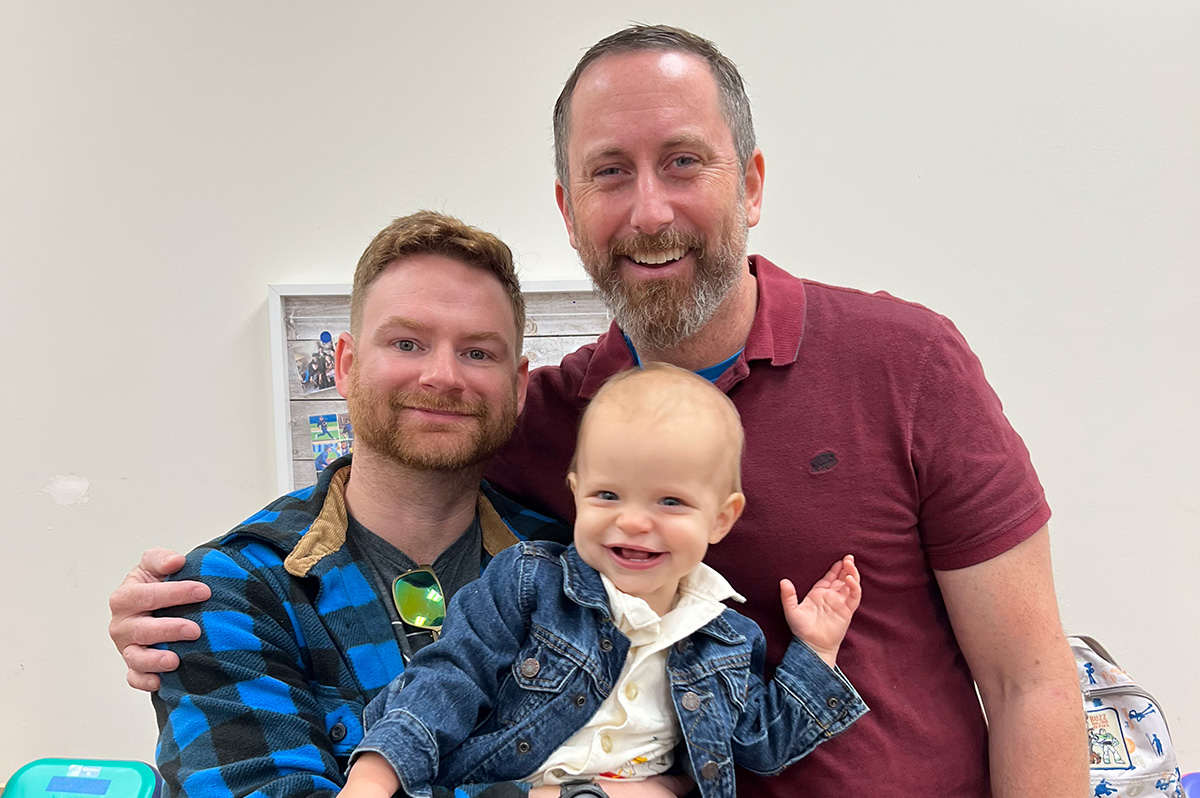
A U.S. District Court judge on Jan. 21 denied a request by attorneys representing the D.C. Metropolitan Police Department to dismiss a lawsuit filed by a gay captain accusing police officials of illegally demoting him for taking parental leave to join his husband in caring for their newborn son.
The lawsuit filed by Capt. Paul Hrebenak charges that police officials violated the U.S. Family and Medical Leave Act, a similar D.C. family leave law, and the Constitution’s Equal Protection Clause by refusing to allow him to return to his position as director of the department’s School Safety Division upon his return from parental leave.
It says police officials transferred Hrebenak to another police division against his wishes, which was a far less desirable job and was the equivalent of a demotion, even though it had the same pay grade as his earlier job.
In response to a motion filed by attorneys with the Office of the D.C. Attorney General, which represents and defends D.C. government agencies against lawsuits, Judge Randolph D. Moss agreed to dismiss seven of the lawsuit’s 14 counts or claims but left in place six counts.
Scott Lempert, the attorney representing Hrebenak, said he and Hrebenak agreed to drop one of the 14 counts prior to the Jan. 21 court hearing.
“He did not dismiss the essential claims in this case,” Lempert told the Washington Blade. “So, we won is the short answer. We defeated the motion to dismiss the case.”
Gabriel Shoglow, a spokesperson for the Office of the D.C. Attorney General, said the office has a policy of not commenting on pending litigation and it would not comment on the judge’s ruling upholding six of the lawsuit’s initial 14 counts.
In issuing his ruling from the bench, Moss gave Lempert the option of filing an amended complaint by March 6 to seek the reinstatement of the counts he dismissed. He gave attorneys for the D.C. attorney general’s office a deadline of March 20 to file a response to an amended complaint.
Lempert told the Blade he and Hrebenak have yet to decide whether to file an amended complaint or whether to ask the judge to move the case ahead to a jury trial, which they initially requested.
In its 26-page motion calling for dismissal of the case, filed on May 30, 2025, D.C. Office of the Attorney General attorneys argue that the police department has legal authority to transfer its officers, including captains, to a different job. It says that Hrebenak’s transfer to a position of watch commander at the department’s First District was fully equivalent in status to his job as director of the School Safety Division.
“The Watch Commander position is not alleged to have changed plaintiff’s rank of captain or his benefits or pay, and thus plaintiff has not plausibly alleged that he was put in a non-equivalent position,” the motion to dismiss states.
“Thus, his reassignment is not a demotion,” it says. “And the fact that his shift changed does not mean that the position is not equivalent to his prior position. The law does not require that every single aspect of the positions be the same.”
Hrebenak’s lawsuit states that “straight” police officers have routinely taken similar family and parental leave to care for a newborn child and have not been transferred to a different job. According to the lawsuit, the School Safety Division assignment allowed him to work a day shift, a needed shift for his recognized disability of Crohn’s Disease, which the lawsuit says is exacerbated by working late hours at night.
The lawsuit points out that Hrebenak disclosed he had Crohn’s Disease at the time he applied for his police job, and it was determined he could carry out his duties as an officer despite this ailment, which was listed as a disability.
Among other things, the lawsuit notes that Hrebenak had a designated reserved parking space for his earlier job and lost the parking space for the job to which he was transferred.
“Plaintiff’s removal as director at MPD’s School Safety Division was a targeted, premeditated punishment for his taking statutorily protected leave as a gay man,” the lawsuit states. “There was no operational need by MPD to remove plaintiff as director of MPD’s School Safety Division, a position in which plaintiff very successfully served for years,” it says.
In another action to strengthen Hrebenak’s opposition to the city’s motion to dismiss the case, Lempert filed with the court on Jan. 15 a “Notice of Supplemental Authority” that included two controversial reports that Lempert said showed that former D.C. Police Chief Pamela Smith put in place a policy of involuntary police transfers “to effectively demote and end careers of personnel who had displeased Chief Smith and or others in MPD leadership.”
One of the reports was prepared by the Republican members of the House Oversight and Government Reform Committee and the other was prepared by the office of Jeanine Pirro, the U.S. attorney for D.C. appointed by President Donald Trump.
Both reports allege that Smith, who resigned from her position as chief effective Dec. 31, pressured police officials to change crime reporting data to make it appear that the number of violent crimes was significantly lower than it actually was by threatening to transfer them to undesirable positions in the department. Smith has denied those claims.
“These findings support plaintiff’s arguments that it was the policy or custom of MPD to inflict involuntary transfers on MPD personnel as retaliation for doing or saying something in which leadership disapproved,” Lempert says in his court filing submitting the two reports.
“As shown, many officers suffered under this pervasive custom, including Capt. Hrebenak,” he stated. “Accordingly, by definition, transferred positions were not equivalent to officers’ previous positions,” he added.

